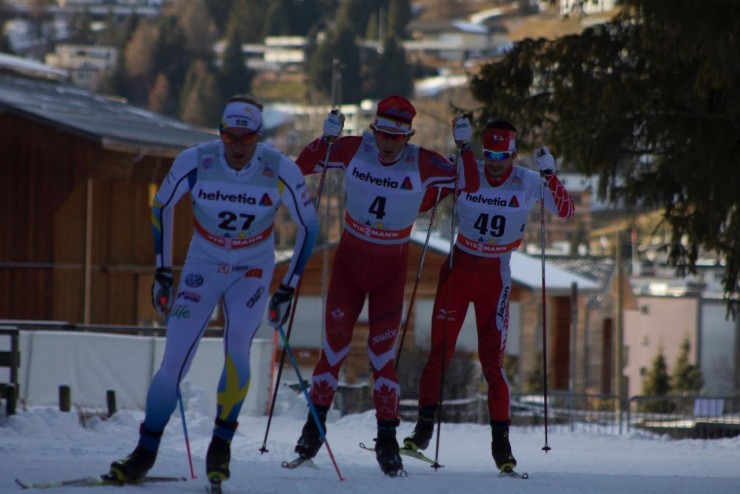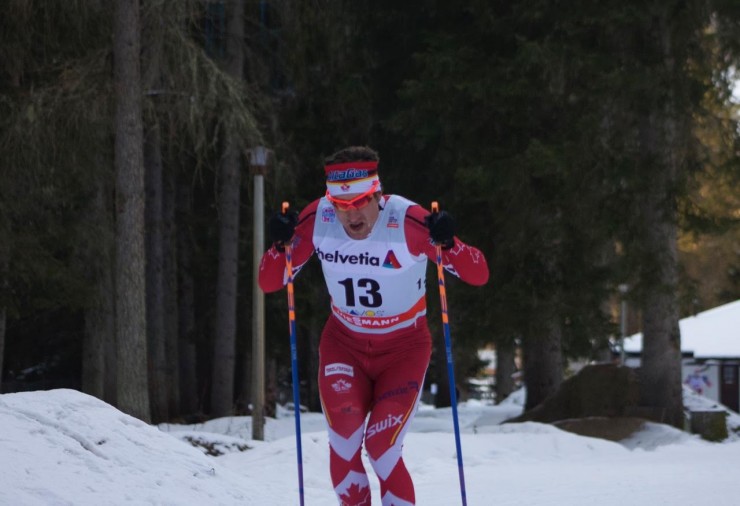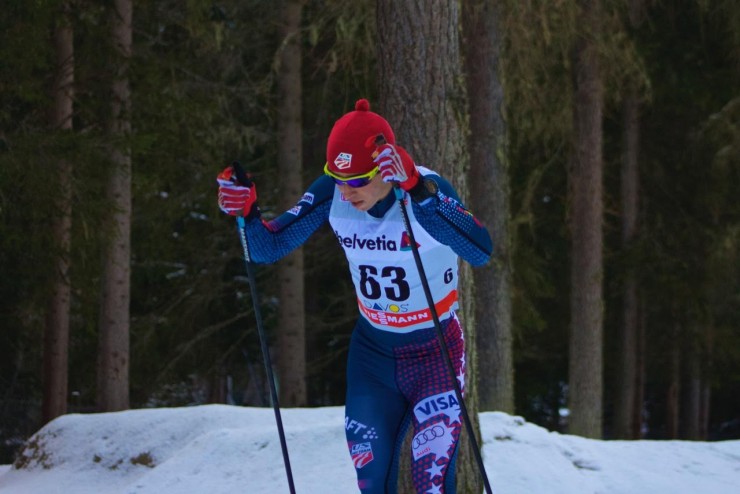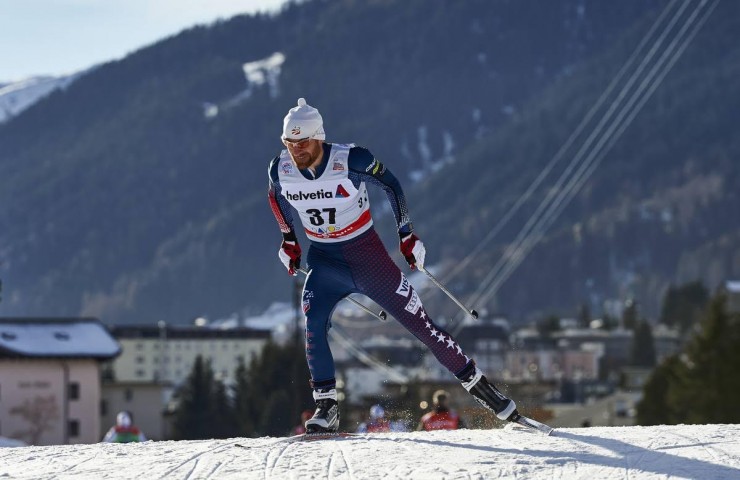
DAVOS, Switzerland — Davos can be postcard-perfect. For spectators of the men’s World Cup 30-kilometer freestyle individual start on Saturday, it was one of those days; a bit of sunblock and trendy sunglasses would have come in handy.
For the racers, on the other hand, much of the 5 k course climbed and descended in the shade, leaving the accoutrements of the glamourous life in the valley totally useless. For a little over an hour, the reality for 80 finishers was stripped to basic endurance-induced pain. The Davos course was either up or down, the lungs seared in what is considered a high-altitude course some 5,100 feet above sea level.
Even Norway’s superman, Martin Johnsrud Sundby, was reduced to human-scale statements.
“The races in Davos kill me every year,” Sundby told FIS.
Davos didn’t exactly terminate Sundby’s reign. He bested the men’s field, finishing first with a time of 1:06.27.9. France’s Maurice Manificat placed second, 20.7 seconds behind, and Norway’s Anders Gløersen took the third podium spot in third (+28.6).
The top 10 was a crowded affair for France and Norway. Those two countries occupied all of the top nine positions. Only Switzerland’s Toni Livers broke their stranglehold, he squeaked into 10th (+1:13).

That type of top-10 monopoly meant a less-than-stellar day collectively for the North American men. Yet Canada’s 32-year-old Devon Kershaw proved his World Cup ski career may just be on an upswing, skiing to 20th (+1:57.7) as the top North American in the men’s race.
But since 2012, when Kershaw finished second on the overall World Cup standings, Kershaw has struggled to match his consistency. Those negative stats may only be a blip, not a trend.
So far this year, Kershaw has placed in the top 30 in every distance race. If you like steady state, then the 24th, 23rd and 23rd he posted in Kuusamo, Finland, and Lillehammer, Norway, the two previous World Cup weekends could indicate an athlete building towards the positive end of the Red Group; the culmination of the four-monthlong season favors the tortoise not the hare.
Historically, Kershaw has skied well in 30 k freestyle races, albeit mass starts. Dating back to 2006, he placed 22nd in a freestyle mass start in La Clusaz, France, 12th in a 2008 skate mass start in Rybinsk, Russia, 25th in La Clusaz in 2009, and 13th again in La Clusaz in 2010.
However, Saturday’s 30 k skate in Davos was a different problem for Kershaw to solve.
“It’s my first 30 kilometre individual start skate race since 2004, and on that day in Italy it was my worst-ever World Cup race of my life where I finished third last,” he said in a Cross Country Canada press release. “To have some good feelings 11 years later, in an event I’ve been avoiding, was nice.”
Considering he started fourth, the fact that Kershaw ended up 20th was even more of a feat, with hardly anyone to gauge off ahead of him. Seeded skiers who started later, like Sundby, Manificat and Norway’s Petter Northug, could get splits from coaches knowing exactly how much harder they needed to push to secure a top 10.
When the timing wand pushed forward, Kershaw raced off into the unknown.
“My strategy was to start a little bit more relaxed because of the altitude,” Kershaw told FasterSkier in an in-person interview after the race. “We’ve been only been here for six days so I started a little relaxed and picked it up from there. My legs felt good. The body felt good for skating.”
Race strategy matters, and in this case, Kershaw’s tempered pacing paid dividends. At 5 k his time ranked 49th (+38.7). By 10 k he had improved to 39th (+1:05.5) and at 20 k, he was up to 27th, then 21st with 5 k to go.

With little timing information to work with, Kershaw kept a quiet mind. Keeping his speed, he focused on technique.
“I just had two technique cues, like really trying to stand up on the one-skate and the two-skate, and quick and light and even pushes, side to side on the climbs. I just kind of repeated that mantra over and over and over. The next thing you know, the race is done,” Kershaw said.
Asked about Kershaw’s race, Canadian head coach Justin Wadsworth said on the phone he was impressed with Kershaw’s ability to stay in the moment and not get caught up in red-lining it.
“I think he just paced the race really well — Davos being at altitude and the kind course it is, which is mainly climbing followed by a long downhill,” Wadsworth said. “Each lap you just climb up and then you come down and so it is really the pacing on that course that is really important. If you just push a bit too much on the climbing aspect, especially early in the race, it can make you pay for it later.”
Kershaw kept his energy reserves balanced.
“No highlights or low-lights, just kind of a solid race,” he said. “Nothing spectacular, nothing terrible. Just solid.”
As for Alex Harvey, who finished in 22nd (+1:59.7), Wadsworth guessed the thin air may have factored into his result.
“I would expect with the way [Alex] was skiing in Lillehammer, how he skated in Ruka, I was expecting today to be a bit better,” he said. “But 30 k is a hard race, and it’s on a day at altitude. That result is not horrible by any means. We keep going towards the season.”

A third Canadian World Cup Team member, Ivan Babikov was 25 seconds outside the points in 36th (+2:47.6). In his post-race interview with FasterSkier, he noted something important about the individual-start format.
“It’s all about the rides. If you have good people around you, you might be good. Unfortunately I didn’t have anybody but myself for more than half of the race,” Babikov said.
Canadian Senior Development Team skier Graeme Killick placed 46th (+3:59.9).
“[The] 30 k skate really puts you in the hurt locker,” Killick said afterward. “Hard climbs that flood the legs and tricky icy downhills. [I had] hoped to make up time on flats and ease off on climbs to help keep legs fresh.”
Michael Somppi of the Thunder Bay National Development Centre finished 68th (+6:18.4).
Top American, Hoffman Takes a Gamble
The U.S. Ski Team started three men in Saturday’s race, with distance specialist Noah Hoffman heading out in bib 63, 2 1/2 minutes after Sundby, the eventual winner. Sundby’s split times set the standard, but as Hoffman ticked by the timing intervals, something special seemed to be transpiring.
“Hoff definitely got a lot of the fans excited today,” U.S. coach Matt Whitcomb said. “He started the race with a train that had just gone by that he had to chase down and catch.”
That train provided a ride — one that would help Hoffman reach the top end of the timing-interval splits. At 5 k, Hoffman posted the sixth-fastest time (+11.7). A third of the way into the race at 10 k, he sat in 15th (+41.6).

“He took a gamble and came up a bit short. I think he had to go out a bit hard,” Whitcomb said. “Shortly after that lap, he lost contact with that group and things kinda popped open and he started bleeding time.”
In recent years, risk taking — the calculated kind — has been encouraged on the U.S. team. Whitcomb explained that’s a quality he admires.
“He went for it and I love that in a racer. You never win if you don’t send it, if you don’t try,” he said. “You do fail quite a bit but that is part of it.”
“It’s a tough course,” Hoffman said after the race. “I started really hard to go get on [Norway’s Didrik] Tønseth and I thought he’d be a great ride for me and he was. I just wasn’t strong enough once I got on him to stick with him for more than a lap. A disappointing result for sure.”

Hoffman finished as the top American in 52nd (+5:00.1). Brian Gregg (Team Gregg/Madshus), who joined the U.S. squad in Europe 10 days ago, finished his first World Cup race of the season in 65th (+5:43.7).
Catching up with the whirlwind of a multiple-time-zone switch, Gregg remained positive about his first foray of the season into World Cup speed.
“It was fun to catch a ride behind different people, but you had to make sure to keep your own pace and not get too excited,” Gregg said. “It’s good to cheer [my wife] Caitlin on to the top 20.”
The third U.S. male racing, Kris Freeman (Team Freebird) finished 67th (+6:15.1).
“We expected more out of today,” Whitcomb said. “We feel like our team is in better shape than our results expressed today, but we are very comfortable with where everybody is, even those who did not put races together today.
“There is no deep fatigue across the team,” he added. “No injuries, just small, chronic things that are typical for elite athletes. It is going well, but it is one thing to be feeling good and well prepared and another thing to put big results together.”
Racing continues Sunday in Davos with freestyle sprints.
Jason Albert
Jason lives in Bend, Ore., and can often be seen chasing his two boys around town. He’s a self-proclaimed audio geek. That all started back in the early 1990s when he convinced a naive public radio editor he should report a story from Alaska’s, Ruth Gorge. Now, Jason’s common companion is his field-recording gear.



